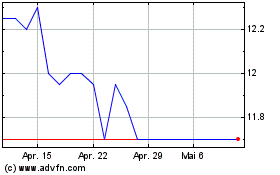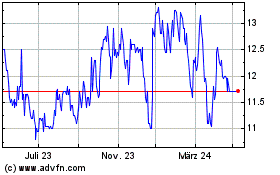Hyloris and Purna Female Healthcare Announce Positive Results from
Phase 2 Trial in Patients with Acute Vulvovaginal Candidiasis (VVC)
Hyloris and Purna Female Healthcare
Announce Positive Results from Phase 2 Trial in Patients with Acute
Vulvovaginal Candidiasis (VVC)
- Both
treatment arms with the combination of Miconazole (2%) and Domiphen
Bromide (0.14% or 0.29%) demonstrated excellent safety and
tolerability
- Low dose
(0.14%) showed significant improvement over active control in
clinical and mycological outcome at day 291
Liège, Belgium – 30 January 2024, 07:00
AM CET – Regulated information – Inside information – Hyloris
Pharmaceuticals SA (Euronext Brussels: HYL), a specialty
biopharma company committed to addressing unmet medical needs
through reinventing existing medications, today announces positive
results for the phase 2 trial of Miconazole Domiphen-Bromide
(MCZ-DB) in patients with acute vulvovaginal candidiasis.
The phase 2 trial of MCZ-DB was a 12-week,
randomized, double-blind, active-controlled, dose finding trial
evaluating the safety and efficacy of two doses of MCZ-DB (MCZ 2%
combined with 0.14% or 0.29% of DB) administered once per day for 7
days in patients with acute vulvovaginal candidiasis. The study has
been conducted in Belgium with a total of 102 patients enrolled.
Efficacy was evaluated by assessing the clinical outcome and
mycological outcome to the treatment. A positive clinical outcome
is a resolution of VVC signs and symptoms whereas the mycological
outcome is determined by a vaginal swab indicating the absence of
Candida species yeast.
Top line results are summarized:
- At day 291, day
57 and day 85, the low dose (MCZ and 0.14% of DB) demonstrated
superior efficacy compared to the active control (MCZ).
- At day 15, both doses administered
demonstrated positive safety and tolerability without significant
superiority over the active control.
- MCZ-DB was well tolerated in both
dose cohorts, with no reported serious adverse events.
- Following the treatments, there was
no indication of systemic exposure to Domiphen Bromide.
Stijn Van Rompay, Chief Executive
Officer of Hyloris, commented: “I am thrilled to announce
promising outcomes for MCZ-DB, showcasing outstanding safety and
tolerability in both cohorts. Additionally, the low dose
demonstrated significant superiority over the active control by day
291. The primary objective of this trial was to identify the most
effective dosage of DB (0.14% or 0.29%) for treating VVC. With
these encouraging findings, we are now prepared to engage in
discussions with relevant authorities for further clinical
investigations”.
About severe and recurring VVC and
MCZ-DBVVC is a prevalent vaginal fungal infection
primarily caused by the yeast Candida albicans, affecting as many
as one in every two women during their life, with about 175 million
units (treatments) sold annually worldwide2. Up to 20% of VVC
patients develop severe to recurrent VVC characterized by
reinfection occurring more than four times per year. These are
long-term conditions that cause significant pain and distress, with
an estimated economic burden from lost productivity projected up to
$14.39 billion annually by 20303. There is a high unmet need
for novel treatment options in severe and rVVC as current standard
of care treatments have significant drawbacks, including lack of
efficacy, the development of drug resistance due to continued use
and liver toxicity4. Preclinical studies have demonstrated that the
activity of Miconazole (MCZ), the current topical standard of care,
when combined with the Miconazole potentiator Domiphen Bromide, can
combat the occurrence and recurrence of mucosal biofilm-related
vaginal Candida infections5. MCZ and DB work synergistically where
DB increases the permeability of the plasma membrane and the
vacuolar membrane of Candida spp., and MCZ acting fungicidal,
thereby destroying fungal activity and potentially preventing
further fungal growth. The synergistic mode-of-action of topical
MCZ-DB has the potential to be effective against azole-resistant
infections, possibly addressing the high unmet needs in recurring
VVC6.
About Hyloris Pharmaceuticals
SAHyloris is a specialty biopharma company focused on
innovating, reinventing, and optimizing existing medications to
address important healthcare needs and deliver relevant
improvements for patients, healthcare professionals and payors. The
Company’s development strategy primarily focuses on leveraging
established regulatory pathways, such as the FDA’s 505(b)2 pathway
in the U.S or equivalent regulatory frameworks in other regions
which are specifically designed for pharmaceuticals for which
safety and efficacy of the molecule have already been established.
This approach can reduce the clinical burden required for market
entry, and significantly shorten the development timelines, leading
to reduced costs and risks.
Hyloris has built a broad, patented portfolio of
18 reformulated and repurposed value-added medicines that have the
potential to offer significant advantages over existing
alternatives. Two products are currently in early phases of
commercialization in collaboration with commercial partners:
Sotalol IV for the treatment of atrial fibrillation, and Maxigesic®
IV, a non-opioid post-operative pain treatment. In addition to its
core strategic focus, the Company has 1 approved high barrier
generic product launched in the U.S. and 2 high barrier generic
products in development.
Hyloris is based in Liège, Belgium. For more
information, visit www.hyloris.com and follow-us
on LinkedIn.
About Purna Female Healthcare
NVPurna Female Healthcare is a spin-off of Purna
Pharmaceuticals, a family-owned Belgian company specialized in the
development and manufacturing of pharmaceutical products. With
proficiency in every facet of drug development and manufacturing,
Purna Pharmaceuticals can seamlessly progress from the initial
stages of innovative ideas or technologies to the industrial
production of the final product.
For more information, contact
Hyloris:Stijn Van Rompay,
CEOStijn.Vanrompay@hyloris.com+32 (0)4 346 02 07Jean-Luc
Vandebroek, CFOJean-luc.vandebroek@hyloris.com+32 (0)478 27 68
42
Disclaimer and forward-looking
statements
Hyloris means “high yield, lower risk”, which
relates to the 505(b)(2) regulatory pathway for product approval on
which the Issuer focuses, but in no way relates or applies to an
investment in the Shares.Certain statements in this press release
are “forward-looking statements.” These forward-looking statements
can be identified using forward-looking terminology, including the
words "believes", "estimates," "anticipates", "expects", "intends",
"may", "will", "plans", "continue", "ongoing", "potential",
"predict", "project", "target", "seek" or "should", and include
statements the Company makes concerning the intended results of its
strategy. These statements relate to future events or the Company’s
future financial performance and involve known and unknown risks,
uncertainties, and other factors, many of which are beyond the
Company’s control, that may cause the actual results, levels of
activity, performance or achievements of the Company or its
industry to be materially different from those expressed or implied
by any forward-looking statements. The Company undertakes no
obligation to publicly update or revise forward-looking statements,
except as may be required by law.
1 p-value <0.052 FIOR Markets 2019; Global Info Research;
IMS3 D.W Denning et al.. Lancet Infectious Diseases (2018); D
Rosati D et al., An Immunological Perspective, Microorganisms
(2020)4 P.G. Pappas et al., Clinical Infectious Diseases
(2016); J.D. Sobel et al., Expert Opinion on Pharmacotherapy
(2018)5 J Tits., J et al., Antimicrob. Agents Chemother
(2020); K. De Cremer et al., Antimicrobial agents and
chemotherapy (2015)6 Manuscript for scientific paper submitted
- 20240130 HY-Purna-EN_FINAL
Hyloris Pharmaceuticals (EU:HYL)
Historical Stock Chart
Von Feb 2025 bis Mär 2025

Hyloris Pharmaceuticals (EU:HYL)
Historical Stock Chart
Von Mär 2024 bis Mär 2025


